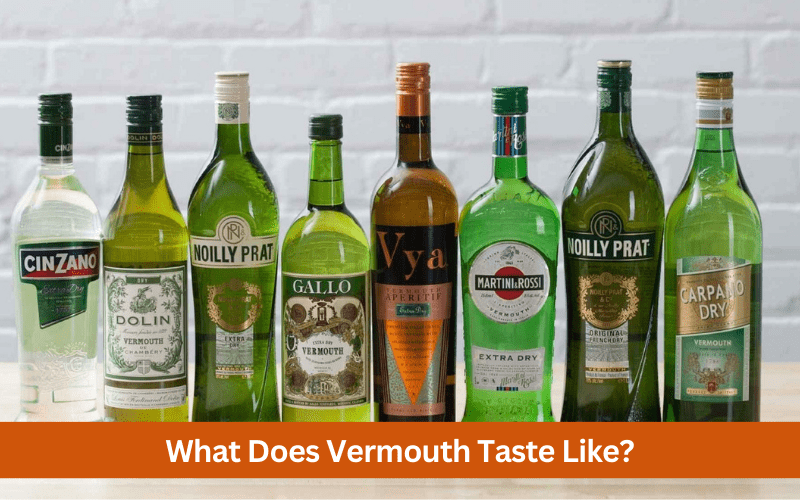Picture this: you’re seated at a stylish bar, surrounded by the gentle hum of laughter and clinking glasses. The bartender, a master of mixology, leans in and asks, what does vermouth taste like? A smile plays on your lips as you recall the countless evenings spent savoring this intriguing elixir. With every sip, a world of flavors dances on your palate, leaving an indelible mark. As the sweet notes intertwine with subtle bitterness, a symphony of botanicals awakens your senses. Your journey through vermouth’s tantalizing taste is a personal odyssey, an exploration of depth and nuance that no two glasses could ever replicate. Join me as we embark on what does vermouth taste like, uncovering the secrets of vermouth and its unparalleled allure.
What is Vermouth? History of vermouth
Vermouth is a fortified wine infused with various botanicals, herbs, and spices, resulting in a unique and complex flavor profile.
Its history dates back centuries, with origins in Europe, particularly in Italy and France. Initially used for medicinal purposes, vermouth evolved into a popular aperitif and key ingredient in classic cocktails. Its rich heritage and diverse production techniques have contributed to the wide range of vermouth styles available today.
Exploring the Spectrum of Vermouth Flavors
Before getting to know what does vermouth taste like, it’s necessary to understand vermouth flavors. When exploring the spectrum of vermouth flavors, you’ll encounter:
- Dry Vermouth: Crisp, subtle, and refreshing.
- Sweet Vermouth: Rich, aromatic, and complex.
- Bianco Vermouth: A delicate balance of sweetness and bitterness.
- Rosso Vermouth: A bold and robust elixir.
- Flavored Vermouths: Discovering a world of exciting and unique flavor combinations.

How Does Vermouth Taste
What does vermouth taste like? Vermouth’s taste can be described as herbal, bitter, spicy, fruity, and floral, offering a unique blend of flavors. Its prominent botanical notes provide a complex and aromatic profile, complemented by a balanced interplay of sweetness and bitterness.
Does vermouth taste good?
Vermouth’s taste is subjective, but many people enjoy its unique flavors and find it pleasing. It is commonly used in cocktails and as an aperitif due to its distinct taste profile.
Does vermouth taste like olives?
While vermouth may have herbal and savory notes, it does not typically taste like olives. However, some types of vermouth may incorporate olive flavors as part of their botanical blend.
Does vermouth taste like wine?
Vermouth is made from wine, but it has distinct characteristics that set it apart. Its botanical infusion gives it a complex flavor profile that is different from regular wine, with a balance of sweetness, bitterness, and various herbal and spice notes.
Does vermouth taste like licorice?
Not all vermouths taste like licorice, but some varieties, especially those with a red hue, may exhibit subtle hints of licorice in their flavor profile. It depends on the specific recipe and botanical blend used in the vermouth.
Does vermouth taste like gin?
Vermouth and gin have different taste profiles. Vermouth has a fortified wine base with botanical infusion, offering herbal, floral, and bitter notes.
Gin, on the other hand, is a distilled spirit flavored primarily with juniper berries and various botanicals, resulting in a distinct and often more pronounced herbal character.
Does vermouth taste like sherry?
Vermouth and sherry have some similarities as fortified wines, but their taste profiles differ. Vermouth typically has a more herbal, aromatic, and complex flavor, whereas sherry has its own distinct nutty, oxidative, and sometimes sweet characteristics.

What Does Vermouth Taste Like: Different Types
Vermouth comes in various types, each offering its own unique taste profile:
What does Spanish vermouth taste like?
Spanish vermouth often exhibits a vibrant and complex taste profile. It tends to have a balanced combination of herbal, citrus, and floral flavors with a noticeable bitterness. Some Spanish vermouths may also showcase notes of caramel or nuttiness, adding depth to the overall taste.
What does extra dry vermouth taste like?
Extra dry vermouth is known for its crisp and refreshing taste. It leans towards a drier side, offering a pronounced herbal character with subtle citrus notes. Extra dry vermouth typically has minimal sweetness and a clean, light-bodied profile that makes it a popular choice for a variety of classic cocktails.
What does spoiled vermouth taste like?
Spoiled vermouth can exhibit a range of unpleasant flavors and aromas. It may taste stale, oxidized, or have a vinegary, sour note. The once vibrant and balanced flavors of the vermouth may be muted or completely altered. It is important to store vermouth properly to avoid spoilage and enjoy its intended taste.
Difference Between Sweet Vermouth and Dry Vermouth
| Sweet Vermouth | Dry Vermouth | |
| Sweetness Level | Pronounced sweetness | Minimal sweetness |
| Flavor Profile | Herbal, spicy, and sometimes fruity | More focused on botanical flavors |
| Bitterness | Balanced bitterness | Can have a slight bitterness |
| Cocktail Usage | Versatile, used in various classic cocktails like Negroni and Manhattan | Popular choice for a Martini or as a dry modifier in cocktails |
| Aromas | Aromatic and inviting scents | Subtle herbal and citrus notes |
| Mouthfeel | Rich and full-bodied | Light-bodied and crisp |
What does sweet vermouth taste like?
Sweet vermouth has a rich, aromatic, and complex taste profile. It offers pronounced sweetness along with herbal, spicy, and sometimes fruity flavors. The overall flavor is well-balanced, providing a delightful sensory experience.
What does dry vermouth taste like?
Dry vermouth has a crisp, subtle, and refreshing taste. It is known for its more focused botanical flavors, with minimal sweetness. Dry vermouth can have a subtle bitterness and is often appreciated for its clean and light-bodied character.

What Vermouth Taste Like: Red Vermouth Vs. White Vermouth
Red and white vermouths, also known as rosso and bianco, respectively, offer distinct taste experiences:
What does sweet red vermouth taste like?
So, what does vermouth rosso taste like?
- Taste Profile: Red vermouth has a bold and robust flavor profile with pronounced bitterness. It features deep herbal and spiced notes, often accompanied by a touch of sweetness.
- Aromas: Red vermouth exudes rich and inviting scents, with aromatic herbs and spices prominent in its bouquet.
- Cocktail Usage: Red vermouth is commonly used in classic cocktails like the Negroni, where its assertive flavors contribute to the cocktail’s overall complexity.
- Pairings: Its intense flavors pair well with strong cheeses, cured meats, and chocolate-based desserts.
What does white vermouth taste like?
- Taste Profile: White vermouth offers a more delicate and nuanced taste. It strikes a balance between sweetness and bitterness, with a mellow and sometimes floral character. Hints of vanilla and citrus may also be present.
- Aromas: White vermouth typically showcases subtle floral notes, along with gentle aromatics of herbs and spices.
- Cocktail Usage: White vermouth is versatile and can be used in a variety of cocktails, including classics like the Martini. It adds depth and complexity without overpowering other ingredients.
- Pairings: Its lighter and more delicate flavors make it a great choice to pair with lighter dishes such as seafood, salads, and fresh cheeses.
Factors Affecting What is Vermouth Taste Like
The taste of vermouth can be influenced by various factors that contribute to its unique flavor profile:
- Base Wine: The type and quality of the base wine used in vermouth production can impact its taste. Different grape varieties and regions can contribute distinct flavors and characteristics to the final product.
- Botanical Blend: Vermouth’s taste is heavily influenced by the selection and combination of botanicals used during the infusion process. Botanicals such as wormwood, herbs, spices, citrus peels, and roots contribute to the complex flavor profile and aromatics.
- Fortification Method: The process of fortifying vermouth with additional alcohol can affect its taste. The choice of fortifying spirit and the level of alcohol added can impact the overall flavor balance.
- Aging and Maturation: Vermouth that undergoes aging, whether in oak barrels or stainless steel tanks, can develop additional depth and complexity. The duration and conditions of aging can influence the flavor profile, imparting subtle nuances and smoothing out any harsh edges.
- Sweetness Level: The amount of added sugar, if any, in the vermouth affects its sweetness level. Sweet vermouth tends to have a pronounced sweetness, while extra dry vermouth is minimal in sweetness.
- Producer’s Style: Each vermouth producer may have their own unique approach and style, which can result in variations in taste. Factors such as blending techniques, recipe variations, and adherence to traditional or innovative methods can contribute to differences in flavor profiles.
- Serving and Pairing: The way vermouth is served and the accompanying food or mixers used can influence the taste experience. Factors such as glassware, temperature, and choice of mixers or food pairings can enhance or complement different flavor elements.
Understanding these factors can help appreciate the range of flavors and nuances that vermouth offers. It also allows for exploration and experimentation to find the vermouth style that suits personal preferences and enhances desired taste experiences.

Is Vermouth a Wine or a Spirit?
Vermouth is considered a type of fortified wine. It starts with a base wine, which is then fortified by the addition of a distilled spirit, typically brandy or neutral grape spirit. The addition of botanicals and herbs during the production process further enhances its unique flavor profile.
While vermouth shares similarities with both wine and spirits, it falls under the category of fortified wine due to its wine base and production method.
Understanding Vermouth: Production Process and Ingredients
Vermouth is crafted through a meticulous production process that involves specific ingredients and techniques. Here’s an overview:
- Base Wine Selection: Vermouth starts with the choice of a base wine, typically a neutral white wine made from grapes such as Trebbiano, Cortese, or Clairette. The quality and characteristics of the base wine influence the final product.
- Fortification: The base wine is then fortified by adding a distilled spirit, often brandy or a neutral grape spirit. This fortification step raises the alcohol content of the vermouth and helps to preserve it.
- Botanical Infusion: Vermouth’s defining feature is the infusion of botanicals. A combination of aromatic herbs, spices, roots, barks, flowers, and citrus peels is macerated or steeped in the fortified wine. Common botanicals include wormwood, gentian, chamomile, cinchona, coriander, and orange peel.
- Sweetening: Depending on the desired style, vermouth may be sweetened. Sweet vermouth is infused with sugar or caramelized sugar to add a pronounced sweetness, while extra dry vermouth contains minimal or no added sugar.
- Aging and Blending: Some vermouths undergo aging to allow the flavors to harmonize and develop further complexity. This can occur in oak barrels or stainless steel tanks. After aging, the vermouth may be blended to achieve consistency and balance across different batches.
- Filtration and Bottling: Prior to bottling, the vermouth is typically filtered to remove any sediment or impurities. It is then bottled, often with the addition of a closure such as a cork or screw cap.
By carefully selecting base wines, employing specific botanical blends, and following precise production methods, vermouth producers create the distinct flavors and characteristics that make vermouth a versatile and beloved beverage.
Health Benefits Of Vermouth
While moderation is key, vermouth can offer several potential health benefits when consumed responsibly. Here are some of the potential positive effects:
- Digestive Aid: Many vermouth recipes include botanicals known for their digestive properties, such as wormwood and gentian. These ingredients may help stimulate digestion and alleviate digestive discomfort.
- Aperitif Properties: Vermouth has traditionally been enjoyed as an aperitif, consumed before a meal to stimulate the appetite. Its herbal components can help prepare the digestive system for food intake.
- Antioxidant Content: Some botanicals used in vermouth production, such as chamomile and citrus peels, contain antioxidants that help combat oxidative stress and reduce the risk of chronic diseases.
- Aromatic Herb Benefits: Various herbs used in vermouth production, like thyme, sage, and coriander, may possess antibacterial, antifungal, or anti-inflammatory properties, contributing to overall well-being.
- Medicinal Traditions: Historically, vermouth has been used for medicinal purposes, primarily due to the presence of wormwood. It was believed to have tonic and vermifuge (parasite-expelling) properties.
- Stress Reduction: The ritual of enjoying vermouth, especially in a relaxing and social setting, can contribute to stress reduction and overall enjoyment.
- Potential Cardiovascular Benefits: Some studies suggest that moderate wine consumption, including vermouth, may have cardiovascular benefits, such as reducing the risk of heart disease, due to the presence of polyphenols in wine grapes.
How to Drink Vermouth
Vermouth can be enjoyed in various ways, allowing you to explore its flavors and versatility. Here are some suggestions on how to drink vermouth:
- Neat: Sipping vermouth on its own is a great way to appreciate its unique flavors. Pour a small amount into a glass and enjoy the complexities of the botanicals. Start with dry vermouth for a lighter experience or sweet vermouth for a more aromatic and rich taste.
- On the Rocks: Pour vermouth over ice to chill it slightly and dilute the flavors. This method can enhance the refreshing qualities of dry vermouth or add a subtle coolness to the sweetness of sweet vermouth.
- Vermouth Cocktail Classics: Vermouth is a key ingredient in several classic cocktails. Try iconic drinks like the Martini (mix vermouth with gin or vodka) or the Negroni (combine vermouth, gin, and Campari) to experience the harmonious blend of flavors.
- Vermouth Spritz: Mix vermouth with sparkling water or club soda, along with a twist of citrus, to create a refreshing and low-alcohol spritz. This is an ideal option for those seeking a lighter and effervescent vermouth experience.
- Vermouth Tonic: Similar to a gin and tonic, mix vermouth with tonic water for a crisp and herbal drink. Garnish with a slice of citrus or a sprig of fresh herbs for added aroma and visual appeal.
- Vermouth in Culinary Creations: Vermouth can be used in cooking to enhance flavors in sauces, marinades, or as a glaze for roasted meats. Its botanical notes add depth and complexity to a variety of recipes.

Other Ways to Use Vermouth
Aside from drinking vermouth neat or in cocktails, there are various creative and delicious ways to incorporate vermouth into your culinary and mixology endeavors. Here are some alternative uses for vermouth:
- Cooking Ingredient: Add vermouth to your favorite recipes to enhance flavors. It can be used in sauces, marinades, and deglazing pans to create rich and aromatic dishes. Vermouth complements seafood, poultry, vegetables, and even desserts.
- Vermouth Reduction: Simmer vermouth in a saucepan until it reduces and thickens to create a flavorful vermouth reduction. This can be drizzled over grilled meats, roasted vegetables, or used as a glaze for a touch of depth and complexity.
- Vermouth-infused Syrups: Create vermouth-infused syrups by simmering vermouth with sugar until it forms a syrup-like consistency. These syrups can be used to sweeten cocktails, dressings, or poured over desserts for an extra layer of flavor.
- Vermouth-Marinated Fruits: Soak fruits like berries, citrus slices, or stone fruits in vermouth to infuse them with its flavors. Enjoy the vermouth-infused fruits on their own, as a topping for ice cream, or incorporate them into salads for a unique twist.
- Vermouth Sorbet: Make a refreshing sorbet by combining vermouth, sugar, and fruit juice or puree. Churn the mixture in an ice cream maker for a delightful and sophisticated frozen treat.
- Vermouth-Soaked Olives: Enhance your cocktail garnishes or antipasto platters by marinating olives in vermouth. The vermouth adds complexity to the olives and makes them a perfect accompaniment to drinks or appetizers.
- Vermouth-infused Butter: Incorporate vermouth into softened butter to create a flavorful compound butter. Spread it on bread, melt it over grilled steaks, or use it as a finishing touch for pasta dishes.
These are just a few examples of how vermouth can be used creatively in both culinary and mixology applications. Let your imagination and taste preferences guide you as you explore the versatile possibilities of vermouth in your kitchen and bar.
How Long Does Vermouth Last?
The shelf life of vermouth can vary depending on factors such as the type of vermouth, storage conditions, and whether it has been opened or unopened. Here are some general guidelines:
- Unopened Vermouth: Unopened bottles of vermouth, when stored properly in a cool, dark place away from direct sunlight and excessive heat, can maintain their quality for an extended period, typically up to 1-2 years or sometimes even longer. However, it’s always advisable to check the expiration date on the bottle for specific recommendations from the producer.
- Opened Vermouth: Once a bottle of vermouth has been opened, its flavor and freshness can gradually deteriorate over time due to oxidation. Refrigerating opened vermouth can help slow down this process and extend its shelf life. Generally, opened vermouth can be enjoyed for several months to a year, but it’s recommended to consume it within a few months for optimal flavor.
How to Store Vermouth
Proper storage is essential to maintain the quality and flavor of vermouth over time. Here are some guidelines on how to store vermouth:
- Seal the Bottle: Always ensure the vermouth bottle is tightly sealed after each use. The airtight seal helps prevent oxidation and maintains the freshness of the vermouth.
- Refrigeration: Refrigerate vermouth after opening to slow down oxidation and preserve its flavors. The cool temperature helps maintain its quality for a longer period. It is recommended to store vermouth in the refrigerator door or a cool dark place.
- Avoid Sunlight: Protect vermouth from direct sunlight or excessive heat, as it can degrade the flavors and aromas. Keep the bottle away from windows or other sources of heat to prevent flavor deterioration.
- Limited Exposure to Air: Oxygen exposure can impact the taste of vermouth over time. Try to limit the amount of air in the bottle by pouring the vermouth into smaller containers as you consume it, minimizing the headspace.
- Freshness Check: Vermouth, like any wine-based product, can lose its freshness over time. Check the expiration date on the bottle and aim to consume it within a reasonable period after opening, typically within a few months to a year for optimal flavor.
- Smell and Taste Test: Before using vermouth that has been stored for an extended period, give it a sniff and taste to ensure it hasn’t gone bad. Spoiled vermouth may exhibit off odors, such as vinegar-like or musty aromas, and may have a noticeably altered taste.
By following these storage practices, you can prolong the shelf life of vermouth and continue to enjoy its delightful flavors in cocktails, cooking, or sipping on its own.

Should Vermouth Be Refrigerated?
Yes, it is generally recommended to refrigerate vermouth after opening. Refrigeration helps slow down oxidation and preserves the flavors and quality of the vermouth. Storing it in the refrigerator ensures it stays fresh for a longer period.
Type of Vermouth You Should Use
When selecting vermouth for your drinks or recipes, consider the following types:
- Sweet Vermouth: Sweet vermouth, also known as red or rosso vermouth, is a popular choice for adding richness and complexity to cocktails. It pairs well with whiskey, dark spirits, and can be used in classic cocktails like the Negroni or Manhattan.
- Dry Vermouth: Dry vermouth, also referred to as white or bianco vermouth, is lighter and less sweet compared to sweet vermouth. It is commonly used in classic cocktails like the Martini or as a dry modifier in various mixed drinks.
- Extra Dry Vermouth: Extra dry vermouth offers even less sweetness than regular dry vermouth. It is often preferred by those who prefer a crisp and minimal sweetness in their cocktails.
- Bianco Vermouth: Bianco vermouth, also called white or blanc vermouth, is a slightly sweeter style with a delicate balance of sweetness and bitterness. It works well in both classic and modern cocktail recipes.
- Rosé Vermouth: Rosé vermouth adds a blush of color and unique flavors to cocktails. It combines the characteristics of sweet and dry vermouth, offering a harmonious balance of sweetness and botanicals.
- Flavored Vermouth: Flavored vermouths include variations infused with additional ingredients like citrus, fruits, spices, or botanical blends. These can add a twist to your cocktails or recipes, allowing for experimentation with different flavor profiles.
Best Vermouth Cocktails Must Try!
Here are some classic and must-try vermouth cocktails that showcase the versatility and flavors of this delightful spirit:
- Martini: A timeless classic, the Martini combines gin and dry vermouth. Adjust the ratio to your preference for a dry or wet Martini. Garnish with a lemon twist or olive.
- Negroni: This iconic cocktail blends equal parts gin, sweet vermouth, and Campari. It offers a perfect balance of bitterness, sweetness, and herbal complexity. Garnish with an orange twist.
- Manhattan: A sophisticated cocktail that features rye whiskey, sweet vermouth, and a dash of bitters. Stirred and served in a chilled glass with a cherry garnish.
- Americano: A refreshing aperitif cocktail consisting of equal parts sweet vermouth and Campari, topped with soda water. Garnish with an orange slice.
- Boulevardier: A cousin of the Negroni, this cocktail substitutes gin with bourbon or rye whiskey. Combine whiskey, sweet vermouth, and Campari in equal parts. Garnish with an orange twist.
- Vesper: Made famous by James Bond, the Vesper combines gin, vodka, and a touch of dry vermouth. Shake and strain into a martini glass, garnish with a lemon twist.
- Bamboo: A light and aromatic cocktail featuring dry vermouth, dry sherry, and a few dashes of bitters. Stirred and served over ice with a lemon twist or cherry garnish.
- Hanky Panky: An intriguing mix of gin, sweet vermouth, and Fernet-Branca. Stirred and strained into a cocktail glass, garnish with an orange twist.
- Adonis: This elegant cocktail combines equal parts sweet vermouth and dry sherry, with a dash of orange bitters. Serve on the rocks or strain into a coupe glass.
- Rosita: A tequila-based cocktail featuring reposado tequila, sweet vermouth, dry vermouth, and Campari. Stirred and strained into a chilled glass with a lemon twist or cherry garnish.
These vermouth cocktails highlight the delightful flavors and versatility of vermouth, allowing you to explore different combinations and find your favorites. Cheers to enjoying these classic concoctions!

FAQs
Does vermouth taste like vanilla?
Vermouth does not typically taste like vanilla. Its flavor profile is more complex, with herbal, floral, and sometimes bitter notes. While vermouth may contain botanicals that contribute to its unique taste, vanilla is not a predominant flavor in most vermouths.
Which vermouth is sweet?
Sweet vermouth, also known as red or rosso vermouth, is the type of vermouth that has pronounced sweetness. It is often used in classic cocktails like the Negroni and Manhattan. Examples of sweet vermouth brands include Carpano Antica Formula, Martini & Rossi Rosso, and Cocchi Vermouth di Torino.
What is the point of vermouth in a martini?
Vermouth plays a crucial role in a martini by providing balance and complexity to the drink. It adds aromatics, subtle sweetness, and herbal notes that complement the flavors of the base spirit, usually gin or vodka. Vermouth brings depth and character to the martini, creating a well-rounded and satisfying cocktail.
Can vermouth get you drunk?
Vermouth, like any alcoholic beverage, can contribute to intoxication if consumed in excess. Its alcohol content typically ranges from 15% to 18% ABV (alcohol by volume). It’s important to drink responsibly and in moderation to avoid excessive alcohol consumption and its potential effects.
Can you mix vermouth with Coke?
While it is less common, vermouth can be mixed with Coke or other carbonated beverages for a different flavor experience. However, it’s worth noting that vermouth’s botanical and herbal flavors may not harmonize as well with the flavors of Coke compared to other mixers typically used with vermouth, such as tonic water or soda water.
Why don’t you shake vermouth?
Vermouth is generally stirred instead of shaken in cocktails to preserve its delicate flavors. Shaking can potentially over-dilute the vermouth and result in a cloudy appearance. Stirring gently blends the ingredients while maintaining the vermouth’s texture and aromatic qualities.
Can you drink vermouth as a shot?
While vermouth is often enjoyed in cocktails or sipped on its own, it is not typically consumed as a shot. Due to its distinct and complex flavor profile, vermouth is usually savored slowly to appreciate its nuances rather than consumed quickly in a shot format.
Is vermouth Gluten-Free and suitable for vegans?
Most vermouths are gluten-free as they are made from fermented grapes or grains that do not contain gluten. However, it’s essential to check specific vermouth brands, as some may use ingredients or processes that could introduce gluten. Additionally, vermouth can be suitable for vegans, but certain brands may use animal-derived fining agents, so it’s important to verify individual labels or contact the producer for confirmation.
Is vermouth always suitable for sipping on its own?
Vermouth can be enjoyed on its own, either neat or on the rocks. However, the preference for sipping vermouth alone varies from person to person due to its distinct flavors, which may be more appreciated when combined in cocktails or paired with food. Exploring different vermouth styles and brands can help determine personal preferences for sipping.
Why is vermouth used in so many cocktails?
Vermouth is widely used in cocktails due to its versatility and ability to enhance the flavors of other ingredients. Its botanicals and herbal notes add complexity and balance to cocktails, elevating the overall taste experience. Vermouth’s aromatic qualities make it a valuable ingredient in many classic and contemporary cocktail recipes, allowing for a wide range of creative combinations and flavors.
Conclusion
In the realm of spirits, few elixirs possess the captivating allure and diverse range of flavors as vermouth. So, what does vermouth taste like? Vermouth is a symphony of sensations that awakens the palate with each sip. The crisp dryness of a well-crafted dry vermouth entices with subtle herbal undertones, while the rich sweetness of a sweet vermouth offers a tapestry of aromatic complexities. Whether exploring the delicate balance of bianco vermouth or savoring the bold robustness of rosso vermouth, each style holds a unique charm. The interplay of botanicals, bitterness, and sweetness creates an enchanting harmony that lingers on the tongue, leaving a lasting impression.
It is a journey of flavors that can only be truly understood through firsthand tasting, inviting you to immerse yourself in the seductive world of vermouth and unravel the secrets held within each bottle.
I’m Chen Mina, from Vol de Nuit, who has a special passion for bartending, especially mixing wine, beer, and cooktail. Here you will find content about alcoholic beverages, I will bring you knowledge that few people know about this drink.





